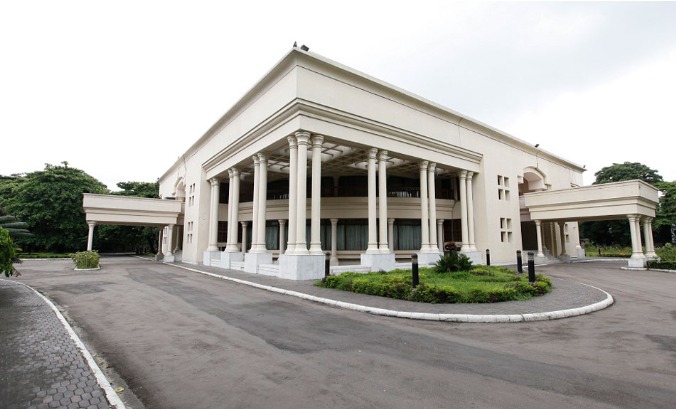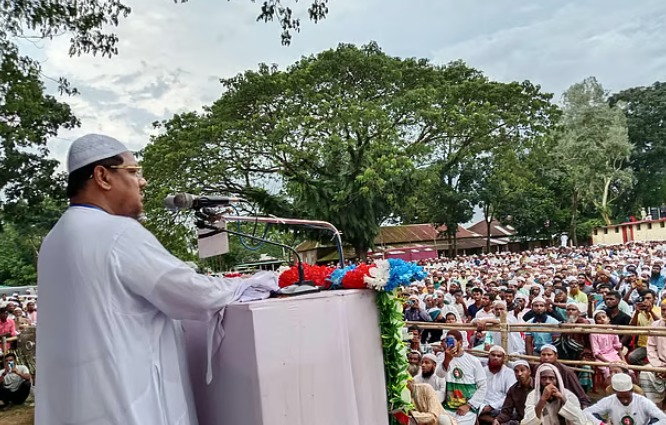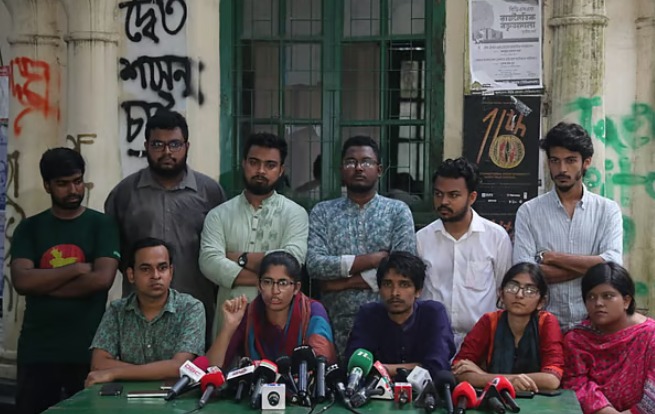Desk Report:
Chief Advisor Dr. Muhammad Yunus is meeting with BNP and Jamaat on Saturday evening regarding the situation that has arisen in the last few days. The meeting is scheduled to begin at 7 pm at the State Guest House Jamuna.
Earlier, the political situation was gradually heating up on various issues including the elections. Especially, the pressure on the government from BNP was increasing on the elections. In the meantime, the situation became more complicated after the Army Chief’s statement urging to hold elections by December first came to social media and later to the mainstream media.
In this situation, news came out that the chief advisor had expressed his intention to resign. The matter first came to the media through Nahid Islam of the National Citizens Party (NCP). Last Thursday evening, Nahid met the chief advisor. Advisors Asif Mahmud and Mahfuz Alam were present there. Nahid said that he went to meet him after receiving the news that the chief advisor had expressed his intention to resign.
Then the unrest in the government and political arena increased further. Statements were posted on social media blaming each other. Jamaat-e-Islami proposed an all-party meeting. Five parties including NCP held a meeting at the call of Charmonai Pir. BNP said that they do not want the resignation of the chief advisor.
Today, after the meeting of the National Economic Council (ECNEC) chaired by the chief advisor, Planning Advisor Wahiduddin Mahmud told reporters, “The chief advisor is not resigning. He is staying with us.”
In this situation, the focus is now on the meeting to be held by the chief advisor with the BNP and Jamaat in Jamuna. It is believed that important decisions will come from this meeting. There is speculation about what announcements may come. The two main issues of the ongoing political unrest are the election roadmap and the controversy over the government’s three advisors. Apart from this, reforms, July charter, local elections – these issues are also on the table for discussion.
Meanwhile, a high-level meeting of BNP, Jamaat and NCP leaders was held at a house in Ramna in the capital last night regarding the emerging situation. Although no one officially acknowledged the meeting, sources said that BNP and Jamaat, who have been political allies for a long time but are now fierce rivals, have reached a single decision on the elections. They are willing to give the government time until December or at most February next year. However, the NCP is still somewhat inflexible about their position. They want the July charter announcement, reforms, local elections, and Constituent Assembly elections before the elections. Along with this, the NCP has also sought the restructuring of the Election Commission.
At a press conference at the temporary office in Bangla Motor this afternoon, NCP convener Nahid Islam clarified his party’s position on the elections. He said that his party wants the July charter, reforms, justice and election roadmap together from the interim government.
It is believed that the final announcement on the election roadmap will be made only after the meeting of the chief advisors with BNP and Jamaat. All parties are fairly in agreement on this issue. Only the date remains to be specified. BNP has been raising serious objections to the proposal to hold local government elections before the parliamentary elections from the beginning. Jamaat and NCP have been demanding that local elections be held first. It is not clear how far this issue has been discussed in yesterday’s tripartite meeting.
BNP’s position on reforms is the same as before. According to them, the preparation for the elections and the reform process can run in parallel. BNP’s top leaders have said many times that the government should do as much reform as is necessary for the elections. The elected government will do the rest. NCP in particular has always objected to this issue. They are in favor of carrying out fundamental reforms of the state, including the constitution, during the interim government to implement the aspirations of the mass uprising. Jamaat’s position is also largely in favor of NCP. As a result, consensus on reforms is still uncertain. This issue is expected to be clarified in the Jamuna meeting.
In addition, BNP in particular has been seen objecting to various statements made by government advisors Mahfuz Alam and Asif Mahmud Sajeeb Bhuiyan at various times. Since the formation of a new party of students who led the mass uprising, BNP has been questioning the moral basis for these two advisors to be in the government. Several leaders have also commented that the impartiality of the government will be questioned if they are in charge. However, there have been allegations of BNP’s influence in various government institutions, including the bureaucracy and the judiciary. Not only the NCP, but also the two advisors mentioned above have given such indications.
Nahid Islam said at a press conference today that the National Citizen Party has no relationship with advisors Asif Mahmud Sajeeb Bhuiyan and Mahfuz Alam. They went to the government as representatives of the mass uprising. An attempt is being made to discredit them by linking them with the NCP. This is very purposeful.
The situation that arose around the swearing-in of Ishraq Hossain as the mayor of Dhaka South City has brought the BNP and the government face to face on the issue of the two advisors. Government sources also say that the national elections have been unclear due to the comments of some government advisors and some important people outside.
The government is also under a lot of pressure regarding these two advisors. A decision regarding them may be taken in a meeting with the two parties in Jamuna today. Various sources indicate that they may also be removed from their duties.
Meanwhile, many say that such a situation is taking advantage of the differences between the government and the army.
The seeds are being sown. Many believe that the tension between the government and the army, especially around the National Security Advisor, has gradually taken a complicated form.
Dr. Khalilur Rahman, a foreign officer of the 1979 batch of the Bangladesh Civil Service, was appointed as the High Representative of the Chief Advisor on the Rohingya issue and priority issues. He was later made the National Security Advisor. This is the first time in the history of Bangladesh that someone has been appointed to this position. Many believe that since there has been no such civilian position on national security issues for a long time, it has now created a conflict between civilian and military jurisdiction. Observers believe that the conflict has been brewing for a long time. Discussions on the humanitarian corridor in Rakhine have added fuel to that conflict. At one stage, the BNP demanded the resignation of Dr. Khalilur Rahman.
In view of various objections, an important decision may also be made regarding Dr. Khalilur Rahman. There is a high possibility that he will be removed from his post.
In broad terms, the BNP seems to be adamant on these two issues – the roadmap for the parliamentary elections and the removal of the three advisors.
In this situation, it remains to be seen whether the much-discussed issues such as the July Charter, local elections, the trial of the Awami League and its allies, and reforms will become unimportant.




